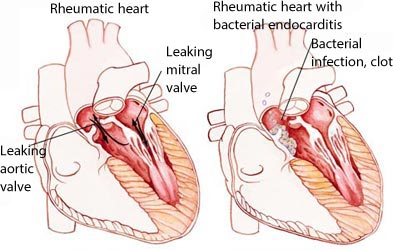Rheumatic Fever
Acute rheumatic fever is an autoimmune inflammatory process associated with streptococcal infection (e.g. strep throat and scarlet fever). Most commonly this disease affects children from 5 to 15 years of age. Thankfully, rheumatic fever is a rare complication of the streptococcal infection. Nonetheless, many people suffer from rheumatic fever each year, especially those in developing countries.
The most serious complication of rheumatic fever is permanent heart damage. The body’s own immune system starts attacking the heart muscle and valves which can lead to heart failure and acquired heart valve disease. This happens due to antibody cross-reactivity, which means that the antibodies that form as a result of streptococcal infection also attack the body’s own proteins, causing an autoimmune reaction.

Aside from the heart, rheumatic fever can also damage large joints (usually elbows, knees, and hip joints), skin, and brain. The fact that this disease affects large joints differentiates it from rheumatoid arthritis which usually only affects small joints of hands and feet.
Contents:
Causes of Rheumatic fever
Symptoms of Rheumatic fever
Diagnosis of Rheumatic fever
Treatment of Rheumatic fever









